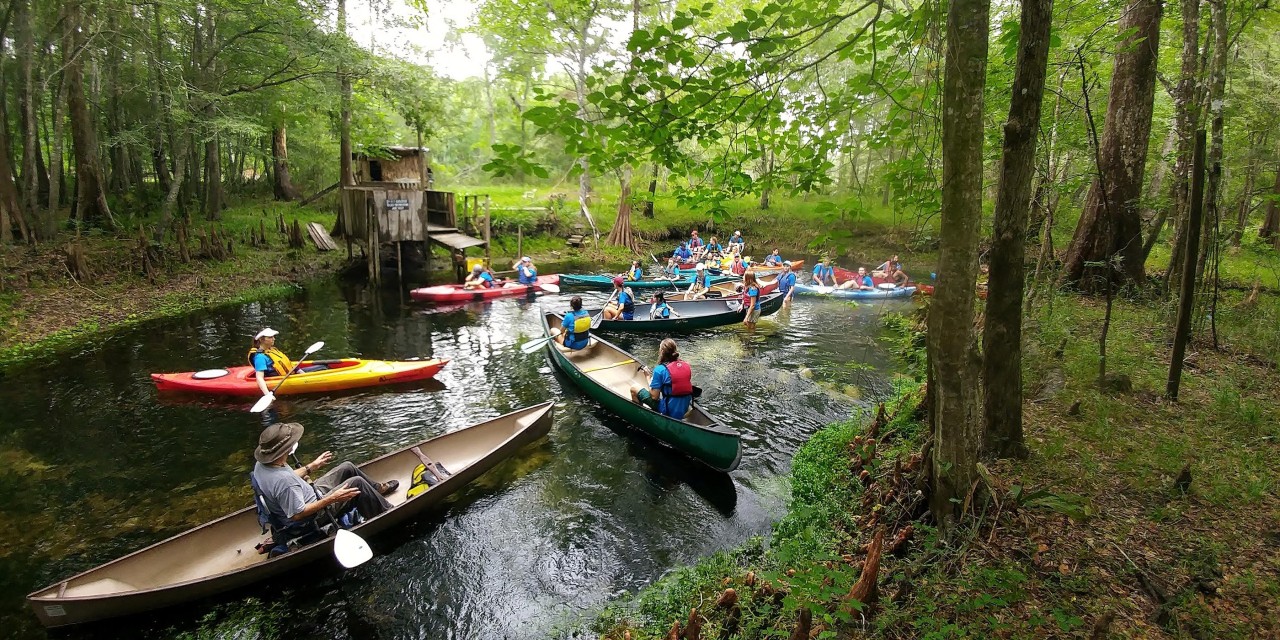In partnership with the Florida Humanities Council, the University of Florida (UF) Center for the Humanities and the Public Sphere (CHPS) is exploring the past, present, and future of water in Florida. In two separate week-long residential summer programs with high school students and K-14 and informal educators on campus in Gainesville, the program helps introduce diverse students from across the state to the humanities.
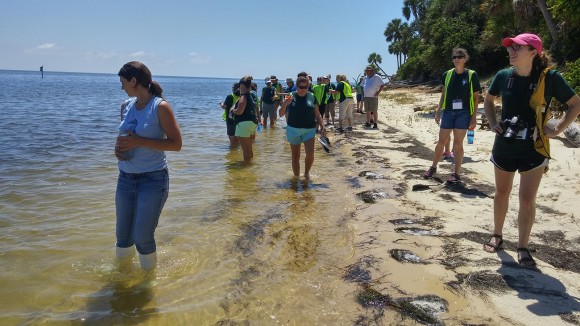
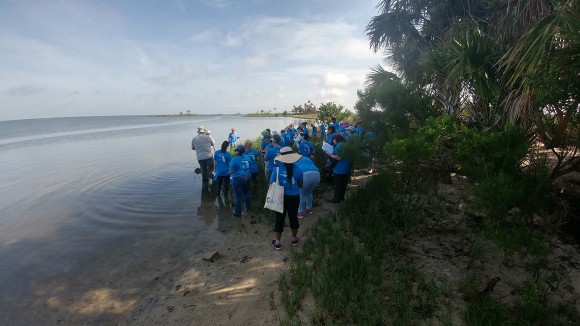
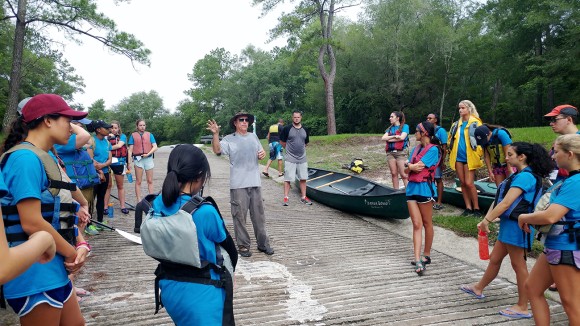
The high school program and the educators’ program share a core curriculum focused on storytelling, CHPS Associate Director Sophia Krzys Acord explains. “Our theme is Florida water stories and we’ve embraced the nomenclature of storytelling... to say that we live in a place that we don’t necessarily understand. We don’t know the stories of people outside of our families. We might not even know our family stories. What the humanities do is help us to understand the stories of all the groups that live in Florida.”
Humanities in the Sunshine State is collaborative in its design and its implementation. Florida Humanities Council Associate Director Patricia Putman explains that its partnership with the university enables the humanities council to magnify its impact across the state “without being on the ground every minute of every day.” The collaboration extends beyond the funding of the program, Putman continues: “As a state council with a limited budget and limited resources, we rely on our partners to implement programming. But we’re not simply writing a check. We were very collaborative from the beginning, sharing best practices from teachers programs that we have run in the past; consulting on the agenda and site visits; and connecting [the Center] to other scholars that we’ve used and both at the University and throughout the other communities that they take the kids to.”
The humanities are as important as ever for high school students, Putman says: “Now more than ever, it’s so important that young kids are learning the value of civil discourse and just some of these basic tenets of the humanities.”
The programs introduce Floridians to the humanities by approaching Florida’s relationship with water and climate change from a number of disciplinary perspectives. “The foundation of the workshop is history, because you need to understand why Florida has the relationship to water that it does,” Acord explains. As the program’s lead instructor Steve Noll explains, “For the longest time in Florida, too much water was the problem. Therefore, we worked to get rid of the water by filling and dredging and building. As the state's growth exploded after World War II, we began trying to reclaim and pump up water from the aquifer to meet the needs of agriculture, development, and industry, which created new water problems.”
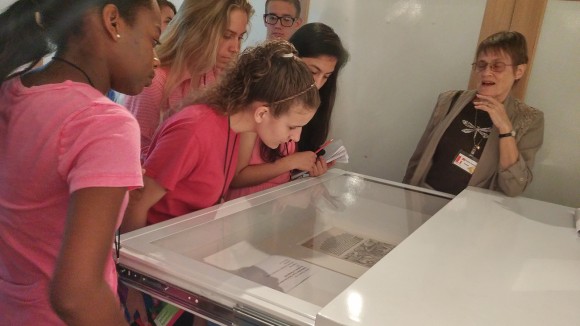
Perspectives from other disciplines add richness to the curriculum. Religious studies helps participants understand the relationships between water and sacred space, in particular how different groups including indigenous populations have valued water and conceived of the environment. Studying languages and literature helps participants understand the lives of different groups in Florida. “We’ve had a Haitian Creole studies scholar talk about the ways in which Haitian Americans talk about social issues through rap music,” Acord explains.
Archaeology has proven to be an especially powerful way of approaching Florida’s environmental history. “Archaeology is wonderful because those are our oldest stories,” Acord says. “The archaeologists help us to see how the issues we’re facing in Florida actually are not new. People have been adapting to different kinds of climatic variations, different types of sea level rise, for millennia, and their lives provide valuable lessons that we could learn from in terms of living flexibly with water instead of trying to control it.”
During their time on campus, teachers produce “action plans” to incorporate what they’ve learned into existing state-approved standards for use during the school year. The action plans are also uploaded on the program’s website, making them available for a broader group of teachers.
Teachers have incorporated what they have learned in a number of ways. One participating AP environmental science teacher in a Tampa-area public school uses oral history to explore environmental history, Acord says: “They do oral histories with their grandparents about weather events, then they correlate these events with [historical] geographic data.” The oral histories “let students look at people’s actual experiences of what these weather fluctuations were. We get a lot of science teachers. I think the classroom teachers especially see the humanities as a way to make what they teach real and personalized and relate to Florida.”
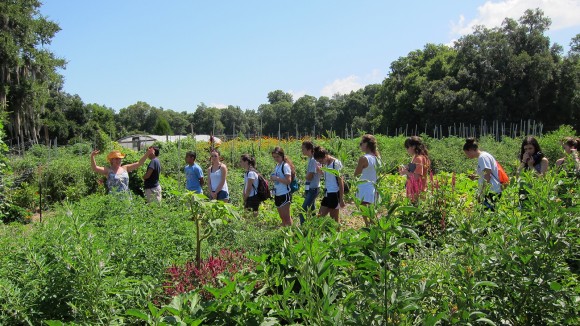
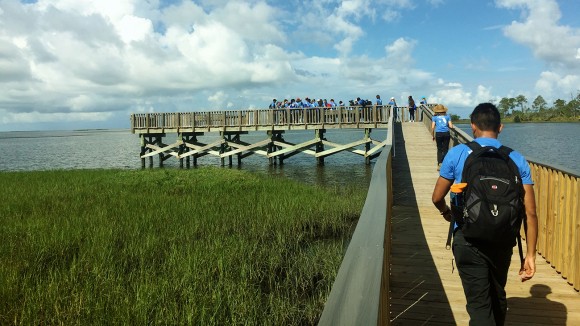
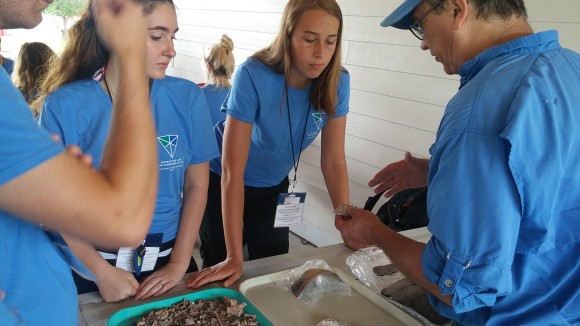
Other teachers have used literature and writing in creative ways. “We have a high school biology teacher in Jacksonville who has partnered with a world history teacher to plant a Columbian Exchange Garden of indigenous plants,” Acord says. The two teachers combined their lessons around this garden, learning about plant biology while examining the ethics and global context of sustainable actions. “One of our first teachers on the program is a Language Arts teacher,” Acord continues. “She developed an action plan to teach argumentative writing, which is in the state standards, by having the students do a letter campaign to UNESCO to argue that the Florida Springs should be put on the World Heritage List.”
The summer programs on water are part of CHPS’ broader commitment to mutually beneficial engagement with public partners. The Center offers a series of public lectures followed by smaller seminar discussions to encourage conversation. The Center also convenes an Imagining America working group for faculty, which has led to the creation of professional development activities relating to engaged scholarship. The Center offers a number of funding lines as well, including graduate fellowships and grants for faculty and community partners to fund collaborative projects. Center-affiliated faculty are also involved in committees and working groups across the university to encourage the formal recognition of publicly engaged scholarship.
